-
NASA seeks ideas on locating and exploring asteroids – and redirecting them away from Earth

NASA also released a request for information (RFI) that invites industry and potential partners to offer ideas on accomplishing NASA’s goal to locate, redirect, and explore an asteroid, as well as find and plan for asteroid threats. The RFI is part of a broader NASA program focusing on finding all asteroid threats to human populations and knowing what to do about them.
-
-
Testing the seismic strength of light frame steel construction
A partnership of leading earthquake engineering researchers from top U.S. and Canadian universities and design professionals from the steel industry have begun the final phase of a three-year project to increase the seismic safety of buildings that use lightweight cold-formed steel for their primary beams and columns. Research to conclude with shake-table testing.
-
-
Newark to raise water rates to pay for infrastructure

A report presented to Newark’s city council said that the town’s water and sewer rates will be increased by more than 60 percent over the next ten years in order to pay for $500 million in infrastructure repairs to the town’s faulty and outdated meters, century-old, leaky pipes, and broken valves.
-
-
New Jersey faces costly water infrastructure upgrades
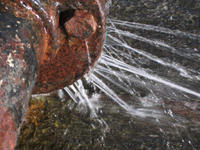
Before Hurricane Sandy hit New Jersey, state officials knew they had much work ahead of them to update the state’s water infrastructure. The damage Sandy inflicted only highlighted the inadequacies of New Jersey’s outdated wastewater, stormwater, and drinking water infrastructure. Upgrading the system will be costly, but not doing so will be costlier.
-
-
U California, Berkeley students win National Student Steel Bridge Competition
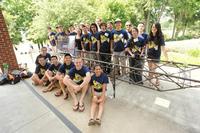
The weekend of 31 May residents of Washington State watched as engineers began erecting a temporary steel bridge over the Skagit River, to replace the 160-foot span of a 4-lane bridge that had collapsed a week earlier, after being struck by an over-height truck. Just sixty miles away, on the campus of the University of Washington in Seattle, 620 civil engineering students erected their own temporary steel bridges in a competition to demonstrate their engineering skills. For the second consecutive year and for the second time in the past seven years, a team of students from the University of California, Berkeley captured the title as champions of the ASCE/AISC National Student Steel Bridge Competition (NSSBC).
-
-
Engineers on a wind load reconnaissance visit to tornado-hit Moore, Oklahoma
Eight days after an EF5 tornado struck Moore, Oklahoma, an 8-member team from the American Society of Civil Engineers’ (ASCE) Structural Engineering Institute (SEI) visited the area to assess the performance of critical facilities that either resisted or suffered significant damage from the estimated 200+ mph winds. The team studied four elementary schools and a hospital, and also examined the failures of long-span roof structures.
-
-
Israel taps 10th graders’ cybersecurity skills to expand cybersecuity recruitment pool
Israel has been subjected to a growing number of cyberattacks – and has itself used cyber-warfare against its adversaries. To make sure it stays ahead, Israel is accelerating its recruitment and development efforts in cybersecurity. Among other initiatives, the country is expanding the pool of potential cyberwarriors by going into high school classrooms to tap the cyber skills of tenth-graders.
-
-
House panel to unveil cybersecurity bill
Republicans on the House Homeland Security Committee are close to finalizing a long-awaited cybersecurity bill, following extensive discussions with private companies.The bill formally establishes DHS’s already-operating National Cybersecurity and Communications Integration Center, to circulate cyberthreat and vulnerability data.
-
-
Earthquake acoustics can indicate a massive tsunami is coming
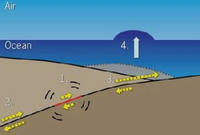
Although various systems can detect undersea earthquakes, they cannot reliably tell which will form a tsunami, or predict the size of the wave. There are ocean-based devices that can sense an oncoming tsunami, but they typically provide only a few minutes of advance warning. Scientists have now identified key acoustic characteristics of the 2011 Japan earthquake that indicated it would cause a large tsunami. The technique could be applied worldwide to create an early warning system for massive tsunamis.
-
-
Thousands of U.S. bridges in “fracture critical” condition
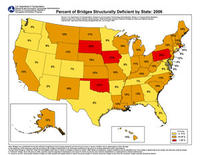
There are currently 66,749 structurally deficient bridges and 84,748 functionally obsolete bridges in the United States – about a quarter of the nation’s 607,000 bridges. With declining federal funds for bridge repair, the burden of maintenance has shifted to states, which spent $28.5 billion last year on bridge work – up from $12.3 billion in 1998.
-
-
Protecting and climate proofing Europe’s coast
The coastline of EU member states extends over 17,000 kilometers. It is home to seventy million inhabitants. The estimated value of the assets within 500 meters from the coast rises to a staggering 1,000 billion Euros. An EU-funded science and engineering initiative is gathering all relevant scientific knowledge to develop a systematic approach to deliver a safe, natural, and climate-proof European coast.
-
-
U.S. hurricane supercomputers need an upgrade
During the hurricane season, which began last week, the U.S. National Weather Service (NWS) will use models from several supercomputers from around the world to generate predictions about hurricanes’ landfall, path, and intensity. Meteorologists say that the two American supercomputers used for storm modeling are underpowered and inferior to European computers.
-
-
Government-developed standards not an effective cybersecurity approach: analyst
DHS said the department has “recently learned of a vulnerability that existed in the software used by a DHS vendor to process personnel security investigations.” analyst says that it is bad enough that hackers gained access to the personal information of thousands, but what is even more worrisome is the fact that DHS, with it spotty cyber security record, has been placed in charge of regulating the cybersecurity efforts of critical infrastructure industries.
-
-
Los Alamos director: cyber-securing U.S. electrical grid key to energy security
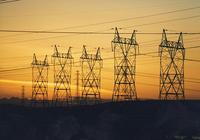
Los Alamos National Lab (LANL) director Charlie McMillan told a gathering of energy executives that securing the U.S. electrical grid is a major concern now, and it is only becoming more serious.
-
-
Hagel says Chinese cyberattacks a “growing threat”
Defense Secretary Chuck Hagel warned of a “growing threat” of cyberattacks against the United States, saying that America and its allies need to “establish international norms of responsible behavior in cyberspace.” Hagel spoke to an audience of defense analysts and defense ministers from Asia and Europe at the annual conference of the International Institute for Strategic Studies on Saturday.
-
- All
- Regional
- Water
- Biometrics
- Borders/Immig
- Business
- Cybersecurity
- Detection
- Disasters
- Government
- Infrastructure
- International
- Public health
- Public Safety
- Communication interoperabillity
- Emergency services
- Emergency medical services
- Fire
- First response
- IEDs
- Law Enforcement
- Law Enforcement Technology
- Military technology
- Nonlethal weapons
- Nuclear weapons
- Personal protection equipment
- Police
- Notification /alert systems
- Situational awareness
- Weapons systems
- Sci-Tech
- Sector Reports
- Surveillance
- Transportation
Advertising & Marketing: advertise@newswirepubs.com
Editorial: editor@newswirepubs.com
General: info@newswirepubs.com
2010-2011 © News Wire Publications, LLC News Wire Publications, LLC
220 Old Country Road | Suite 200 | Mineola | New York | 11501
Permissions and Policies
Editorial: editor@newswirepubs.com
General: info@newswirepubs.com
2010-2011 © News Wire Publications, LLC News Wire Publications, LLC
220 Old Country Road | Suite 200 | Mineola | New York | 11501
Permissions and Policies
